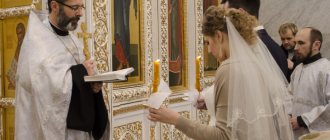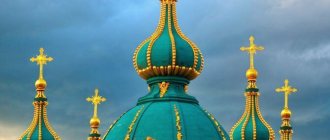ORTHODOX SACRAMENTS,
sacred rites established by divine providence, revealed in Orthodox church rites, through which invisible divine grace is communicated to believers. In Orthodoxy, there are seven sacraments, the seven gifts of the Holy Spirit: baptism, confirmation, Eucharist (comunion), repentance, the sacrament of the priesthood, the sacrament of marriage and the consecration of oil. Baptism, repentance and the Eucharist were established by Jesus Christ himself, as reported in the New Testament. Church tradition testifies to the divine origin of other sacraments.
Sacrament of Baptism
Essence:
A person enters the Church and receives a new, spiritual birth. Until a person is baptized, he remains completely under the power of original sin, but in baptism the person’s way of being changes. He unites with Christ and overcomes dependence on original sin. Without accepting the sacrament of Baptism, a person cannot receive other church sacraments. It can be performed only once; the Creed says about this: “I believe in one baptism for the remission of sins.”
Biblical Reasons:
The sacrament was established by Jesus Christ.
The Gospel of John says: Jesus answered, “Truly, truly, I say to you, unless one is born of water and the Spirit, he cannot enter the kingdom of God”
(John
3
:5).
He Himself was baptized by John the Baptist (Matthew 3
:15-16) and after His resurrection He sent disciples to preach and baptize:
Go therefore and teach all nations, baptizing them in the name of the Father and the Son and the Holy Spirit
(Matthew
28:19
) .
Story:
In apostolic times, people were baptized immediately, with virtually no preparation. Then, from the 2nd century, the practice of catechesis, the preparation of adults for baptism (which took place twice a year, at Christmas and Easter), was established. As a separate divine service, the rite of Baptism developed later.
About the Sacrament of Baptism on the Thomas website
Prayer service
A prayer service, or prayer singing, is a special divine service in which the gracious help of the Lord Jesus Christ, the Blessed Virgin Mary, the Heavenly Powers or the saints of the Orthodox Church is asked. Prayer services serve not only to ask for help in various needs, but also to give thanks for the blessings of God received.
Prayer services are served not only in churches, but also in the homes of believers, on the streets, in the field (when there is no rain), in schools (at the beginning of school), etc.
Prayer services have always been served in Rus', and this was the natural desire of people to ask God for blessings in common prayer. Konstantin Paustovsky describes the following general prayer service in “The Tale of Forests”: “The next morning a priest came from Paramonov with a psalm-reader to serve a prayer service for the sending of rain. All the people with banners came out to a hillock among the fields - from that hillock in clear weather the right bank of the Volga was visible."
Currently, in many churches a prayer service is served every day after the Liturgy - the so-called rite of general prayer. Metropolitan Hilarion (Alfeev) notes: “The almost universal distribution of prayers in the Russian Church testifies to the development of liturgical piety towards semantic simplification with the replacement of more ancient, lengthy and complex texts with simpler, concise and accessible ones”[]. However, not only the ease of perception of prayers serves to spread them. This is also facilitated by directly voicing the requested things: if it is the beginning of the year - a prayer service with petitions for a favorable year; if there is a drought - a prayer service with requests for rain. And, undoubtedly, the desire of people to order a prayer service and come to pray at it grows from service to service.
Sacrament of Confirmation
Essence:
Through anointing with sacred myrrh, a baptized person is given strength to overcome sin and live according to the commandments.
Biblical Reasons:
The Sacrament of Confirmation has its basis in the Gospel:
On the last great day of the feast, Jesus stood and cried out, saying: If anyone thirsts, let him come to Me and drink.
Whoever believes in Me, as the Scripture says, out of his belly will flow rivers of living water. This He said about the Spirit, which those who believed in Him were about to receive: for the Holy Spirit was not yet on them, because Jesus was not yet glorified (John
7
:37-39), and also in the apostolic epistles:
However, you have the anointing of He who is holy and you know everything
(1 John
2:20
),
but He who establishes you and me in Christ and anointed us is God
(2 Cor
1:21
).
Story:
The Council of Laodicea decided to perform this sacrament immediately after Baptism in 343 A.D.
About the Sacrament of World Knowledge on the website of “Thomas”
The most important church rituals in Orthodoxy
A special place is given to the end of life. For believers, guiding a person on his final journey is the most important part of Christianity. For this purpose, the funeral ritual was invented. This is a funeral service that is performed over a deceased person only once. Thus, a funeral service differs from a memorial service or memorial service, which are held many times.
Liturgical texts are sung over the deceased. The order of the ceremony may vary. The purpose of the funeral service is to give peace to the soul of the dead, to inform the Lord that the servant of God has been laid to rest, to ask for forgiveness of sins so that he can go to heaven and receive eternal life.
The funeral service is a separate rite, it is much shorter. The funeral service is held on the third or ninth day after death. There is a separate type of memorial service, which is held on the fortieth day after death.
Another ritual is lithium. In terms of importance, lithium ranks next to the funeral service. It is shorter in time and can be carried out repeatedly in relation to the deceased.
How do rituals differ from sacraments?
Although both words often replace each other in different senses, they carry different meanings.
The sacraments were created and announced by Jesus himself, and the rituals were proclaimed by the church to maintain the spirit of believers. Rituals have not changed for centuries. All of them are carried out taking into account the strict canons described by enlighteners at different times.
Sacrament of the Eucharist
Essence:
The prepared gifts, bread and wine, through the prayer of the Church become the Body and Blood of Jesus Christ, and Christians, by partaking of these Holy Gifts, join Christ, not symbolically, not speculatively, but really.
Biblical Reasons:
The sacrament was established by Christ himself.
In the Gospel of John, the Lord says: He who eats My flesh and drinks My Blood has Eternal Life, and I will raise him up at the last day
(John
6:54
).
On the eve of His death on the cross, He celebrated the first Eucharist at the Last Supper and gave communion to His closest disciples (Matthew 26:26
).
Story:
After the resurrection of Christ, these closest disciples - the apostles - went all over the world to preach the Good News, founded church communities, celebrated the sacrament of the Eucharist themselves and commanded the bishops and priests they appointed to perform it.
About the Sacrament of the Eucharist on the Thomas website
Ordination
Only clergy have the right to celebrate the Eucharist, as well as other Sacraments. The initiation of a simple layman into a clergyman is called “ordination.”
The prototype of the clergy were the apostles. The Gospel tells how the miraculous feeding of several thousand people with a small amount of loaves and fish took place. This is the prototype of the Eucharist, and the apostles here play the role of priests.
Ordination (ordination) happens:
- into the reader;
- to subdeacon;
- to deacon;
- to the priest;
- to the bishop.
Ordination is performed by a higher-ranking ecclesiastical person, usually a bishop. The patriarch himself ordains a bishop.
In this Sacrament, Grace is given to the clergy to shepherd the flock of Christ.
Sacrament of Confession
Essence:
A Christian orally or in writing in the presence of a priest (who in this case is a witness of the repentance offered to God) repents of his sins and receives forgiveness from the Lord.
Biblical Reasons:
The practice of confession has Old Testament origins (Judges
10:10
; Ps
50
; 1 Ezra
9
; Neh
1
:6, 7; Dan
9
: 4-19, 1 Sam
15
:24-25, etc.).
John the Baptist confessed the sins of the people who came to him to be baptized (Matthew 3
:6
).
But most importantly, the Lord directly speaks about this in the Gospel:
Jesus said to them a second time: peace be with you!
just as the Father sent Me, so I send you. Having said this, he blew and said to them: Receive the Holy Spirit. Whose sins you forgive, they will be forgiven; On whomever you leave it, it will remain on him (John
20
:21-23).
Story:
Regular confession originated in the early Christian Church. Initially, it was believed that confession should only be done once in a lifetime, but later the opinion prevailed that it should be done regularly.
About the Sacrament of Confession on the Thomas website
Akathist
In many churches and monasteries in our time, prayer singing is performed with akathists joining them. This practice has become widespread only in the territory of the Russian Orthodox Church and only over the last one and a half to two centuries[].
Akathists are touching church works. The word “akathist” is of Greek origin and means “a hymn that one does not sit while singing,” in contrast to “kathisma.” The akathists are quite simple in content and are easily memorized by ear by believers. (For example, akathists to saints are compiled according to the principle of a brief transcription of the content of their lives). That is why the number of akathists has grown incredibly over the past decades. The total number of akathist texts is over 1200[].
There are akathists to the Savior, the Mother of God, the Guardian Angel, and any of the saints. In the statutes regulating the rule by which it is necessary to prepare for communion, there is an akathist (to the Sweetest Jesus or to the Mother of God). “The frequent repetition of the name Jesus and the name of the Mother of God introduces the reader into living communication and relationship with the Savior and the Mother of God”[].
Sacrament of Anointing
Essence:
When anointing the body of a sick person with specially consecrated oil, the Grace of God is invoked upon him, healing from bodily and mental illnesses and those sins that a person cannot repent of due to his weakness.
Biblical Reasons:
The sacrament has its foundations in the New Testament.
Firstly, these are the words in the Gospel of Mark that the disciples of Christ anointed many sick people with oil and healed them
(Mark
6:13
).
Secondly, these are the words from the Epistle of the Apostle James: If any of you is sick, let him call the elders of the Church, and let them pray over him, anointing him with oil in the name of the Lord.
And the prayer of faith will heal the sick person, and the Lord will raise him up; and if he has committed sins, they will be forgiven him (James
5
:14-15).
It is important to know:
The Sacrament of the Blessing of Anointing, colloquially called unction, began to be understood differently among Orthodox and Catholics. Catholics call the Blessing of Anointing the “last anointing” and is performed only on terminally ill people. In Orthodoxy, Unction is performed not only in the event of a fatal illness. According to tradition, unction is supposed to take place no more than once a year.
About the Sacrament of Anointing on the “Thomas” website
Unction
Photo: Hrampokrova-vrn.ru
This Sacrament is also called the Blessing of Anointing. It is performed in church or at home if a person is seriously ill. The main purpose of Unction is prayer for the healing of the believer from physical ailments. During the Sacrament, oil is blessed and used to anoint parts of the patient’s body. At this time, the Holy Scriptures, the Apostle and special prayers are read.
All this must be repeated seven times in a row. Unction received its name because initially seven priests participated in the Sacrament (hence the conciliar action, that is, joint prayer). Now the church does not prohibit one priest from performing the Sacrament.
( 7 ratings, average: 4.43 out of 5)
Sacrament of Priesthood
Essence:
The ordination of a Christian to the priesthood, giving him the power to perform church sacraments and rituals. Only bishops as successors of the apostles can perform this sacrament. A person who is ordained a presbyter (i.e., a priest) receives the grace to perform the sacraments himself, but only with the blessing of the ruling bishop. And when consecrated as a bishop, the protege receives the grace not only to perform all the sacraments, but also to consecrate others to perform the sacraments - that is, he receives the fullness of apostolic power.
Biblical Reasons:
The priesthood was established in the Old Testament (after the Exodus from Egypt).
The New Testament, on the one hand, states that all Christians are priests to some extent (1 Pet 2
:9), on the other hand, it speaks of priests as a special ministry, as assistants to bishops (1 Tim
3
:2, Titus
1
:7; 1 Pet
2:25
), speaks of elevation to holy orders by the laying on of hands.
Story:
Preaching the Gospel, the apostles created church communities, the heads of which were made by bishops, who ordained elders to help them. Hence the concept of apostolic succession: each priest received ordination from a bishop, who, in turn, from another bishop - and so you can trace the entire chain of ordinations back to the 1st century, to the apostles.
About the Sacrament of Priesthood on the Thomas website
Wedding
The lower ranks of the church (readers and subdeacons) are allowed to marry, but deacons, priests and bishops are not allowed (the latter take monasticism). A person accepting the office of deacon or priest must already be married or never marry again.
Marriage in the church is the union of two people of the opposite sex by choice and love. The sacrament is called “wedding” because during it crowns similar to royal ones are placed on the heads of the couple. This is like a reward for chastity before marriage.
After the Sacrament of Wedding has been performed, two people are already considered husband and wife. Divorce is prohibited by the church, so you need to approach this with all seriousness when choosing a partner for life.
At the wedding, prayers are read for the blessing of married life, successful childbearing, health of members of the new family, family peace and mutual understanding.
In this Sacrament, people are given the Grace of preserving family peace, giving birth and raising children. Marriage is typified by the union of Christ with the Church.











